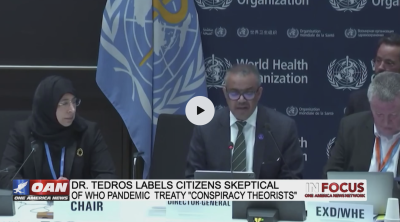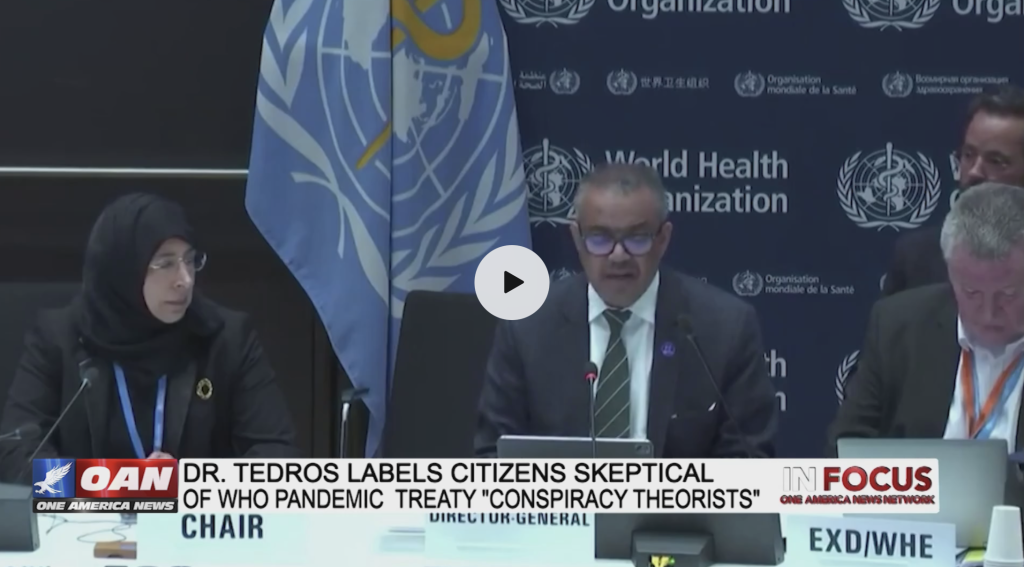Tedros Dismayed at Global Hesitancy on WHO Pandemic Treaty. Analysis by Dr. Peter McCullough
Dr. McCullough Joins Alison Stein for Commentary One America News

All Global Research articles can be read in 51 languages by activating the Translate Website button below the author’s name (only available in desktop version).
To receive Global Research’s Daily Newsletter (selected articles), click here.
Click the share button above to email/forward this article to your friends and colleagues. Follow us on Instagram and Twitter and subscribe to our Telegram Channel. Feel free to repost and share widely Global Research articles.
Donation Drive: Global Research Is Committed to the “Unspoken Truth”
***
Please enjoy this rapid fire interview as I react to several developing stories including Director-General of the World Health Organization Tedros frustration with the lack of world enthusiasm for his attempted power grab through the 2024 Pandemic Preparedness Treaty Alliance and new International Health Regulations. Here is a quick explanation from Canadian MP Leslyn Lewis:
What is the status of the Pandemic Treaty?
The Pandemic Treaty is nearing the end of the negotiation and drafting phase, ultimately due to be signed by May 2024. The WHO established the Intergovernmental Negotiating Body (INB) in December 2021 to spearhead the negotiations, drafting and input into the proposed treaty. Since then, the INB has held several meetings to gather input and discuss proposals for the treaty.
The INB has gone over several iterations of proposals and considered member-state submissions. They are currently finalizing the text for a proposed accord to be presented at the 2024 WHA meeting.
Notably, the change in referring to the pandemic instrument as an accord and not a treaty might signal that there may be a lower threshold of national scrutiny required than that which a formal treaty process would require. A treaty would require that each member state ratify the treaty, should it be legally binding in international law. The precise obligations and compliance measures to be adopted are yet to be determined.
What would the treaty do?
The WHO has stated that the treaty could “ensure better preparedness and equitable response for future pandemics, and to advance the principles of equity, solidarity and health for all.”
It “could take the lessons learned from the COVID-19 pandemic and use them to build back better. Equity is one of the key principles being discussed as part of the work on the new accord.
“A new accord could promote political commitment at the highest level, through ensuring an all-of-government and whole-of-society approach within countries, and sustained and sufficient political and financial investment within and among countries.”[1]
As proposed, a legally binding treaty would see power given to the WHO to direct the global health management of pandemics. The treaty will define and classify what is to be considered a pandemic. Once a pandemic is declared, the WHO would require countries to adopt specific response measures. The working draft of the treaty also proposes a reporting requirement to the WHO and advises that there should be a “global peer review mechanism to assess national, regional and global preparedness capacities and gaps.”
Listen to what Tedros says in the clip. Do you trust him or the WHO?
We also cover the former top White House coronavirus adviser under President Donald Trump, Dr. Deborah Birx with former CNN anchor Chris Cuomo on long-COVID analogies to HIV disease.
Birx is towing the narrative line that all of our ills are attributed to long-COVID with no mention of the vaccine.
Finally, Alison Steinberg asked about a previously unknown type of replicating agent, far smaller and simpler than a virus called an “obelisk” which is a loop of self-replicating RNA that infects commensal bacteria such as streptococcus sanguinis. They discuss how improved understanding of the oral-pharyngeal-gut microbiome raise the possibility of improving our immune defenses.
*
Note to readers: Please click the share button above. Follow us on Instagram and Twitter and subscribe to our Telegram Channel. Feel free to repost and share widely Global Research articles.


